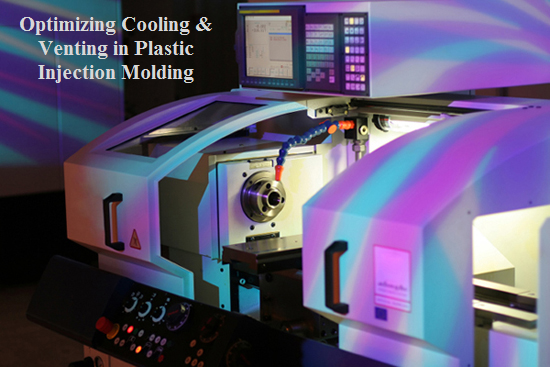Importance of Optimizing Cooling & Venting in Plastic Injection Molding
What is Cooling and Venting Exactly?
Cooling is the process, which helps prevent the produced parts from dimensional problems. Poor surface finishes and short shots are the results of poor cooling. It can also increase the cycle times and scrap. Venting, on the other hand, is required for removing the displaced air in the cavity. If the venting process does not occur properly, then it can result in non-filled parts or gas burns. Venting should be done in a proper amount, because an excess of it can result in the excessive flash. We will explain this in detail in the following sections.
Why is it Important to Optimize Cooling in Plastic Injection Molding?
After the plastic injection molding process is completed, some amount of energy is required for a plastic part to convert the solid resin pellets into a homogenous moldable mass. Thus, before the formation of a stable part, it is necessary to remove an identical amount of heat energy. Various types of metallic molds are used during the process. The rate of heat transfer through one steel mold varies by a considerable amount as that of the other. This is why cooling should be carried out effectively for producing a defect-free and uniform part. Other than steel, you can also choose other heat transfer materials, such as aluminum and copper. However, copper and aluminum are more suitable for small-scale production, since they are soft metals.
How Does Optimizing Venting Help Plastic Injection Molding?
Venting is basically needed to vent out the hot air trapped inside the mold. The mold is almost airtight. Thus, when plastic enters the mold, the air has to escape and make space for it. If there is no venting, then the air cannot escape, however, plastic goes on filling the mold. This increases the air pressure, which can produce heat. This heat can then cause burn marks on the molded part. So, in order to avoid this, proper venting is necessary.
Another problem that can happen in the absence of venting is short shot. In this phenomenon, the flow of resin is restricted by the pressurized air. This also prevents the part from filling completely. This results in an incomplete part or a short shot. Therefore, for avoiding this problem vents are designed with proper depth, as too deep vents can cause the plastic to flash.
This is how important cooling and venting are for building defect free injection molds. You can say, these are the mandatory processes that must be carried out if you want good results. Are you interested in knowing more about the topic? You can always consult the experts, who will guide you with your injection molding requirements, and will also fill you up with more information on cooling and venting. There are a number of companies in the US, such as Brogan Patrick, who have a good expertise in plastic injection molding.

